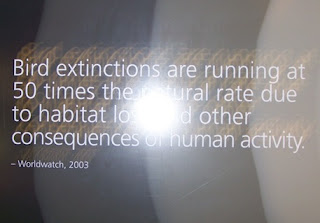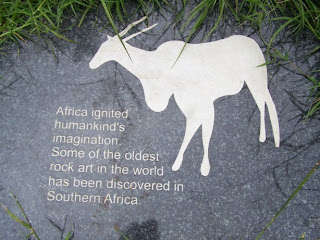 Most palaeoanthropologists believe that our ancestors first left Africa about 2-million years ago and moved into Asia and Europe. This theory is known as “Out of Africa I” and is strongly supported by fossil evidence.
Most palaeoanthropologists believe that our ancestors first left Africa about 2-million years ago and moved into Asia and Europe. This theory is known as “Out of Africa I” and is strongly supported by fossil evidence.They probably left Africa in a gradual expansion, following food in small groups, rather than in a “mass migration”.
 “Out of Africa II” refers to the movement of modern humans out of Africa within the past 100,000 years.
“Out of Africa II” refers to the movement of modern humans out of Africa within the past 100,000 years. They out-competed and replaced populations of other hominids outside Africa, such as the Neanderthals, with whom they could probably not interbreed. This theory is supported by fossil and genetic evidence.
Studies of DNA in modern human populations suggest that we all share common ancestors who lived in Africa some 200,000 years ago.
 Sustainability
SustainabilityTwo hundred thousand years ago, when Homo sapiens first emerged, there were probably at first only a few hundred of us. Now, in the 21st Century, the global population is fast approaching 10-billion people.
 At first, we humans barely made an impact on the environment. But this has changed, as our technological abilities have progressed. Now our activities are causing serious implications for our planet, including the unusually fast extinction of species and global warming.
At first, we humans barely made an impact on the environment. But this has changed, as our technological abilities have progressed. Now our activities are causing serious implications for our planet, including the unusually fast extinction of species and global warming. And we humans have developed very unequally. While the northern hemisphere is generally rich, the southern hemisphere is generally poor. Wealth is unevenly spread. A person who has HIV/AIDS in Africa is more likely to die quickly from the disease because they do not have access to drugs than a person in the USA, for example, where it has become a manageable disease. As our population grows, there is ever-more competition for precious resources for our sustainability as a species such as water and land.
And we humans have developed very unequally. While the northern hemisphere is generally rich, the southern hemisphere is generally poor. Wealth is unevenly spread. A person who has HIV/AIDS in Africa is more likely to die quickly from the disease because they do not have access to drugs than a person in the USA, for example, where it has become a manageable disease. As our population grows, there is ever-more competition for precious resources for our sustainability as a species such as water and land. While we can propel ourselves into space, millions of people starve to death each year, are illiterate and have no access to basic healthcare or clean water, for example.
While we can propel ourselves into space, millions of people starve to death each year, are illiterate and have no access to basic healthcare or clean water, for example. Now that we can do anything, what will we do?






No comments:
Post a Comment